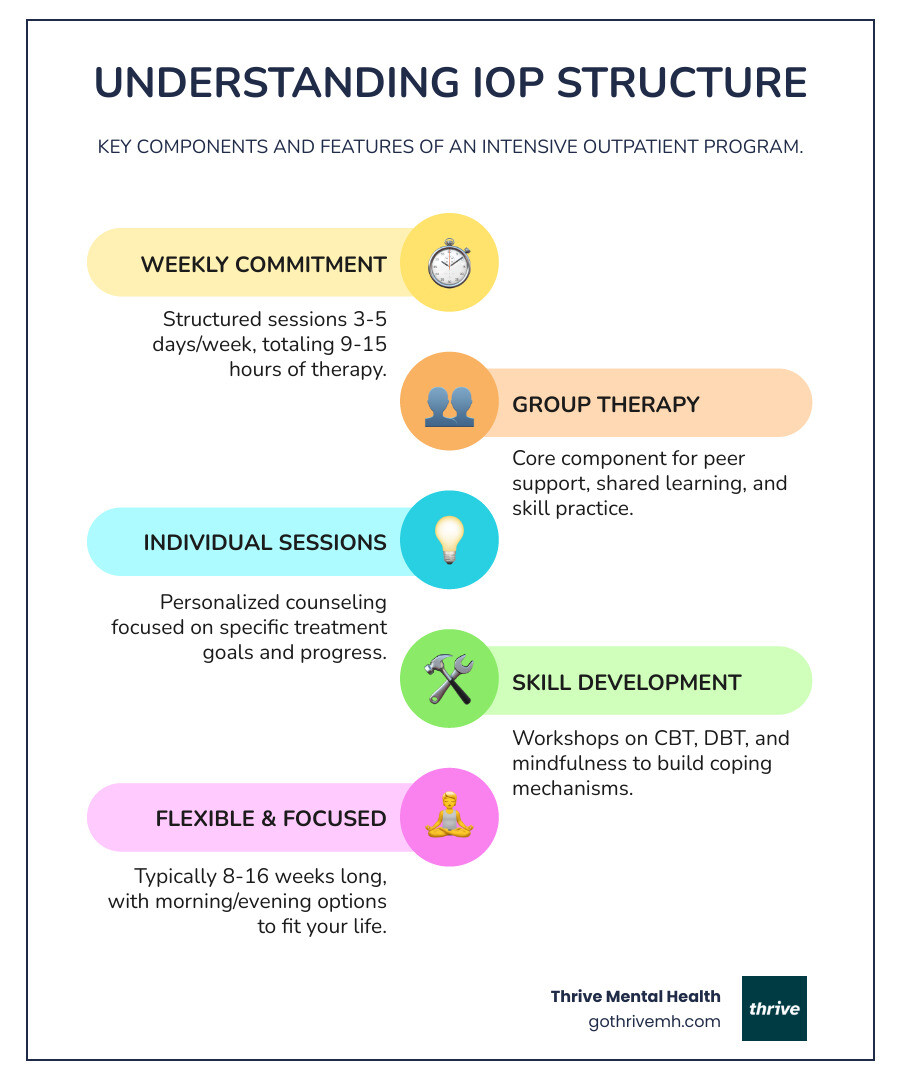Beyond Therapy: Unpacking the Intensive Outpatient Program for Mental Wellness

What is an intensive outpatient program for mental health 1 Key
What Is an Intensive Outpatient Program for Mental Health? 9–15 Hours/Week. Faster Relief. Insurance-Friendly. [2025]
If you’re in crisis, call/text 988 right now. You are not alone.
What is an intensive outpatient program for mental health? It’s a structured, non-residential treatment offering 9–15 hours of therapy per week. This provides more support than weekly sessions without requiring 24/7 hospitalization, helping you build coping skills and stabilize symptoms while maintaining your daily life.
Quick Facts:
- Time Commitment: 3–5 days/week, 2–4 hours per session
- Duration: Typically 8–16 weeks
- Setting: Virtual or in-person options
- Best For: Moderate to severe symptoms when weekly therapy isn’t enough
- Insurance: Often covered by major plans (Cigna, Optum, Aetna, Florida Blue)
When traditional once-a-week sessions aren’t enough for persistent anxiety, depression, or trauma, an IOP steps in. These programs combine group therapy, individual counseling, and skill-building workshops to provide effective tools for managing your mental health. The growth of virtual IOPs has made this intensive support more accessible than ever, allowing residents throughout Florida to attend from home and keep their job.
I’m Anna Green, LMHC, LPC, Chief Clinical Officer at Thrive Mental Health. I’ve spent years leading intensive outpatient programs that help people move from crisis to stability. Understanding what is an intensive outpatient program for mental health is the first step toward finding the right level of care for you.

What is an intensive outpatient program for mental health vocab to learn:
What Is an Intensive Outpatient Program for Mental Health?
What is an intensive outpatient program for mental health? It’s a structured treatment approach providing 9–15 hours of therapy per week without requiring you to live at a facility. Think of it as the middle ground between weekly therapy and full-time hospitalization.
An IOP serves as both a “step-up” from weekly therapy when you need more support and a “step-down” from inpatient care to help you transition back to daily life. The key benefit is that you can still work, attend school, and sleep in your own bed. This allows you to practice the coping skills you learn in real-world situations immediately.
At Thrive Mental Health, our IOPs are built on skill-building. We equip you with practical, evidence-based tools to manage symptoms and prevent relapse. You can explore more details about what is an Intensive Outpatient Program (IOP) on our dedicated page.
Who Should Consider an IOP?
An IOP is often a good fit if you have moderate to severe mental health symptoms that disrupt your life, but you don’t need 24/7 supervision. You might be a good candidate if:
- You experience persistent depression, anxiety, or trauma symptoms that weekly therapy isn’t resolving.
- You have a stable and safe home environment.
- You are motivated to participate actively in your treatment.
- You do not require 24-hour medical supervision or are not in immediate danger to yourself or others.
IOPs are popular with young professionals, students, and parents across Florida who need serious support but can’t pause their lives. We’ve also seen excellent outcomes with veterans and first responders in specialized virtual IOPs. For more details, see our IOP Program Requirements.
What Are the Main Goals of an IOP?
The primary goals of an IOP focus on creating lasting change:
- Stabilize Symptoms: Reduce the intensity of anxiety, depression, or intrusive thoughts to create a foundation for healing.
- Build Coping Skills: Learn evidence-based strategies to manage stress, regulate emotions, and handle triggers.
- Prevent Relapse: Identify warning signs, create safety plans, and build a reliable support network.
- Improve Daily Functioning: Improve your ability to engage at work, in your hobbies, and in your relationships.
- Support Reintegration: Practice new skills in real-world contexts to build confidence and sustainable routines, especially when stepping down from a higher level of care.
Research published in the Journal of Consulting and Clinical Psychology confirms that IOPs can lead to significantly greater symptom reduction for depression compared to traditional weekly therapy.
IOP vs. Other Levels of Care: What’s Right for You?
Understanding the different levels of mental health care helps you find the right fit. What is an intensive outpatient program for mental health in this context? It’s the crucial middle ground, offering more support than traditional therapy without the restrictions of inpatient care.
Matching the treatment intensity to your needs is key. Here’s how the main levels of care compare:
| Feature | Traditional Outpatient Therapy | Intensive Outpatient Program (IOP) | Partial Hospitalization Program (PHP) | Inpatient/Residential Treatment |
|---|---|---|---|---|
| Hours/Week | 1-2 hours | 9-15 hours | 25-35+ hours | 24/7 |
| Supervision | Minimal | Moderate | High | Constant |
| Living Situation | At home, fully independent | At home, independent | At home or supportive living | At facility |
| Best Fit For | Mild to moderate symptoms, ongoing support | Moderate to severe symptoms, stable home, functional | Severe symptoms, crisis stabilization, alternative to inpatient | Acute crisis, severe instability, detoxification |
| Flexibility | High | Moderate | Low | Very Low |
Traditional outpatient therapy (1-2 hours/week) is ideal for managing stable symptoms or for ongoing maintenance.
An Intensive Outpatient Program (IOP) is the right fit when weekly therapy isn’t enough but you’re still able to function day-to-day. It provides 9-15 hours of weekly support while you maintain your schedule.
A Partial Hospitalization Program (PHP) offers a higher level of care (25-35 hours/week) for more severe symptoms. It’s often an alternative to hospitalization or a step-down from inpatient care. Learn more about IOP vs. PHP: What’s the Difference? to see which might be right for you.
Inpatient or residential treatment provides 24/7 care in a hospital setting and is reserved for acute crises when safety is the primary concern.
This continuum of care allows your treatment to adjust as your needs change. You can “step up” to a higher level of care when you need more support or “step down” as you stabilize. At Thrive, we assess your current needs to ensure you receive the right level of care at the right time in Florida.
Inside an IOP: Structure, Therapies, and a Typical Week
Understanding the structure of what is an intensive outpatient program for mental health can help you see how it fits into your life. Most IOPs involve 3–5 days of programming per week, totaling 9–15 hours. A typical program runs 8 to 16 weeks, though the duration is custom to your progress.
Flexible scheduling, with morning and evening sessions available to our clients in Florida, allows you to continue working or attending school. Every person receives an individualized treatment plan to address their unique challenges.

What Does a Typical IOP Week Include?
A week in an IOP is a blend of different therapeutic activities designed to build a comprehensive mental health toolkit.
- Group Therapy: This is the core of the IOP. Meeting with a consistent group creates a safe, supportive space to work on shared challenges like managing emotions and improving relationships.
- Individual Therapy: These one-on-one sessions allow you to dig deeper into personal issues and apply skills from group therapy to your specific life situations.
- Family Therapy: When appropriate, sessions with family members can improve communication and build a more supportive home environment.
- Medication Management: Regular check-ins with a psychiatrist ensure any prescribed medications are working effectively toward your goals.
- Psychoeducation: These sessions provide practical knowledge about your symptoms and your brain’s response to stress, which can be empowering.
- Peer Support: Connecting with others who understand your struggles is an invaluable part of the healing process, reducing feelings of isolation.
Evidence-Based Therapies in IOPs
We use therapies backed by research to ensure the most effective treatment.
- Cognitive Behavioral Therapy (CBT): Helps you identify and challenge negative thought patterns that contribute to depression, anxiety, and PTSD.
- Dialectical Behavior Therapy (DBT): Teaches skills in mindfulness, distress tolerance, emotion regulation, and interpersonal effectiveness to manage overwhelming emotions.
- EMDR Therapy: Helps your brain process traumatic memories, reducing their emotional impact and relieving PTSD symptoms.
- Mindfulness Practices: Teaches you to observe your thoughts and feelings without judgment, creating space to make healthier choices.
- Mentalization-Based Therapy (MBT): Focuses on understanding your own and others’ mental states to improve relationships and reduce confusion.
Conditions Treated & The Rise of Virtual IOPs
The growth of IOPs has been significant, partly due to the rise of virtual programs. A virtual intensive outpatient program for mental health allows you to participate from the comfort of your home, removing barriers like commuting and scheduling conflicts for residents across Florida.
This flexibility has been a game-changer for people in rural areas, parents, and busy professionals. Our virtual therapy approach delivers the same evidence-based care as in-person programs, making it easier to attend consistently and achieve real progress.

What Mental Health Conditions Can IOPs Treat?
IOPs are designed to treat a wide range of mental health challenges. At Thrive, we provide specialized care for:
- Depression: Rebuilding motivation and reconnecting with life.
- Anxiety Disorders: Learning practical strategies to manage panic, worry, and social anxiety.
- Trauma and PTSD: Using therapies like EMDR to process difficult experiences.
- Bipolar Disorder: Focusing on mood stabilization and skill development.
- Self-Harm or Suicidal Thoughts: Providing intensive support with safety planning and coping skills.
Crisis Support: If you’re having suicidal thoughts, call/text 988 or visit the National Suicide Prevention Lifeline. If you or a loved one are in immediate danger, call 911.
We also treat co-occurring conditions for individuals on the autism spectrum and offer integrated approaches for substance use disorders, eating disorders, OCD, and personality disorders using therapies like DBT and CBT.
Why Choose a Virtual IOP?
Research shows that virtual IOPs deliver outcomes comparable to in-person programs. The real question is whether the format fits your life.
- Accessibility: Virtual IOPs eliminate barriers like transportation and distance to a treatment center.
- Convenience: Flexible scheduling, including evening sessions, makes it possible to get help without pausing your work or school life.
- Comfort: Many clients find it easier to engage in therapy from the safety and privacy of their own homes.
At Thrive Mental Health, our Virtual Intensive Outpatient Programs provide expert care to clients throughout Florida. You get the same high-quality treatment without having to rearrange your life.
Cost, Insurance, and How to Enroll in an IOP
When considering an IOP, practical questions about cost and enrollment are important. We believe in being transparent about these aspects of care.

Financial Considerations & Insurance
The cost of what is an intensive outpatient program for mental health depends on program duration, location, and your specific treatment plan. The good news is that many major insurance plans cover IOPs as a medically necessary service.
At Thrive Mental Health, we are in-network with most major providers, including Cigna, Optum, Florida Blue, and Aetna. Your specific out-of-pocket cost will depend on your plan’s deductible, copays, and coinsurance. Our team is here to help you steer your benefits.
You can verify your insurance in 2 minutes with our no-obligation online tool. We’ll help you understand your coverage and any potential costs before you begin. For more information, our guide on how to read mental health insurance benefits can be a helpful resource.
How to Enroll
Getting started at Thrive is a straightforward, supportive process:
- Initial Assessment: You’ll have a phone or video call with a clinician to discuss your needs and determine if an IOP is the right fit. If another level of care is better suited for you, we’ll help you find the right resources in Florida.
- Insurance Verification: While we assess your needs, we’ll also verify your insurance coverage so you have a clear financial picture from the start.
- Personalized Plan: Once we confirm an IOP is a good fit, we’ll collaborate with you to create a custom treatment plan that addresses your specific goals.
- Flexible Scheduling: We’ll find a schedule that works for you, with morning and evening sessions available to accommodate your life.
Our guide to choosing the right therapy options in your area can also help you feel confident in your decision.
Life After IOP: Aftercare and Sustaining Progress
Completing an IOP is a major achievement, but the journey continues. Sustaining the progress you’ve made requires a solid aftercare plan. This plan acts as a bridge from intensive treatment back to everyday life, helping you maintain stability.
Transition Planning
Toward the end of your IOP, our team in Florida will work with you to create a personalized discharge plan. This roadmap is designed for your specific needs and goals. Key components often include:
- Step-Down Therapy: Gradually reducing treatment intensity, such as transitioning from an IOP to weekly individual therapy sessions.
- Alumni Programs: Staying connected with peers who understand your journey provides ongoing support and reminds you that you’re not alone.
- Community Support Groups: Groups like 12-step programs or other peer-led communities offer accountability and encouragement.
Continued Therapy and Relapse Prevention
Stepping down from an IOP doesn’t mean stopping therapy. Continued support helps reinforce the skills you’ve learned and provides a safety net for new challenges.
- Individual and Group Therapy: Ongoing sessions, even in a less intensive format, help you process daily life events and address setbacks before they become crises.
- Relapse Prevention: A core focus of aftercare is having a plan to manage triggers and old patterns. You’ll regularly review your coping skills and update your safety plan as needed.
Ongoing Support
Our commitment to your well-being is long-term. Thrive’s aftercare resources are designed to support our Florida clients through periodic check-ins, educational materials, and the option to step back up to a higher level of care if needed. We’re here for the long haul, not just the crisis.
Frequently Asked Questions About Intensive Outpatient Programs
It’s natural to have questions when considering an IOP. Here are clear, honest answers to some common concerns.
Can I keep working or go to school during an IOP?
Yes. This is a key benefit of IOPs. Most programs, especially virtual ones, offer flexible morning or evening sessions designed to fit around your work or school schedule, allowing you to maintain your responsibilities while in treatment.
How long does an IOP last?
Most IOPs run for 8–16 weeks. However, the exact duration is personalized based on your individual needs and progress. Your therapist will work with you to determine the right time to transition to a lower level of care.
Is a virtual IOP as effective as in-person?
Yes. Research consistently shows that virtual IOPs deliver similar outcomes to in-person programs. The effectiveness depends on the quality of the therapy and your engagement, not the location. Many find the comfort of home makes it easier to open up.
Does insurance cover IOP?
In most cases, yes. Major insurance plans like Cigna, Optum, Florida Blue, and Aetna typically cover IOPs as medically necessary. Your specific benefits will depend on your plan. We can verify your benefits in minutes to clarify your coverage.
Are IOPs available in Florida?
Yes. Thrive offers virtual and hybrid IOP/PHP options across Florida. Our virtual platform ensures you have access to expert care whether you’re in Miami, Orlando, Tampa, or anywhere else in the state.
{
"@context": "https://schema.org",
"@type": "FAQPage",
"mainEntity": [
{
"@type": "Question",
"name": "Can I keep working or go to school during an IOP?",
"acceptedAnswer": {
"@type": "Answer",
"text": "Yes. Most IOPs, especially virtual ones, offer morning or evening sessions to fit your schedule. This flexibility allows you to maintain your daily responsibilities while receiving intensive treatment."
}
},
{
"@type": "Question",
"name": "How long does an IOP last?",
"acceptedAnswer": {
"@type": "Answer",
"text": "Most programs run 8–16 weeks, depending on your needs and progress. The duration is individualized, with your therapist helping determine the best discharge date based on your treatment progress."
}
},
{
"@type": "Question",
"name": "Is a virtual IOP as effective as in-person?",
"acceptedAnswer": {
"@type": "Answer",
"text": "Yes. Research shows virtual IOPs deliver similar outcomes for most people, offering comparable effectiveness in symptom reduction and skill development. The key is consistent engagement and a personalized treatment plan."
}
},
{
"@type": "Question",
"name": "Does insurance cover IOP?",
"acceptedAnswer": {
"@type": "Answer",
"text": "Many plans (Cigna, Optum, Florida Blue, Aetna) cover IOP. Thrive can verify your benefits in minutes, helping you understand your specific coverage and any potential out-of-pocket costs."
}
},
{
"@type": "Question",
"name": "Are IOPs available in Florida?",
"acceptedAnswer": {
"@type": "Answer",
"text": "Yes. Thrive offers virtual and hybrid IOP/PHP options across Florida. Our virtual platform ensures you have access to expert care whether you're in Miami, Orlando, Tampa, or anywhere else in the state."
}
}
]
}
Ready to Take the Next Step?
If weekly therapy isn’t enough and you’re struggling to break through, an intensive outpatient program for mental health can provide the support you need right here in Florida. You don’t have to choose between getting better and living your life.
Ready for support? Thrive offers virtual and hybrid IOP/PHP with evening options for Florida residents. Verify your insurance in 2 minutes (no obligation) → Start benefits check or call 561-203-6085. If you’re in crisis, call/text 988.